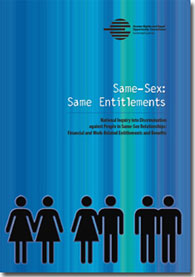Source: Human Rights Watch
In letters to Prime Minister John Howard and opposition leader Kevin Rudd, Human Rights Watch urged the Australian government to amend legal provisions that exclude same-sex partners from the definition of "spouse," and to end all discrimination against lesbian and gay people's children and families.

"Howard's government claims that it is 'defending marriage,' but in reality its policies hurt families," said Boris Dittrich, advocacy director of the Lesbian, Gay, Bisexual, and Transgender Rights Program at Human Rights Watch. "The government's own human rights commission has confirmed that denying equal rights can damage and divide same-sex couples and their children."
On June 20 the Human Rights and Equal Opportunity Commission (HREOC), which is an independent statutory body, launched its report on discrimination against same-sex couples. The report, "Same-Sex: Same Entitlements," named 58 federal laws on Australia's books that deny basic financial and work-related entitlements to lesbian and gay couples.
The commission's report found that, "Same-sex couples and families get fewer leave entitlements, less workers' compensation, fewer tax concessions, fewer veterans' entitlements, fewer health care subsidies, less superannuation and pay more for residential aged care than opposite-sex couples in the same circumstances." The report traced this pervasive inequality back to how lesbian and gay couples are excluded from federal law's definitions of couples, partners and spouses.
Family relationships among lesbian and gay parents and their children are often not recognized in law. Someone who has co-parented a child may have no rights if a partner dies. Children can be left vulnerable, their best interests neglected.
In 2004, Howard's government passed a law expressly defining marriage as exclusively heterosexual. Last year the government ordered Australian embassies not to issue certificates of unmarried status to Australian citizens seeking to marry a gay or lesbian partner in countries where same-sex marriage is legal. In June 2006, his government invoked special powers to overturn a law in the Australian Capital Territory that would have created civil unions for lesbian and gay couples in that jurisdiction.
"Children are not protected when their parents are left outside the law," said Dittrich. "Australia must ensure that its policies are brought in line with international law."
In two historic cases involving sexual orientation, Australia was found in breach of international obligations under the International Covenant on Civil and Political Rights by the United Nations Human Rights Committee, which oversees compliance with the treaty. In Toonen v Australia, the Committee in 1994 overturned Tasmania's sodomy law, holding that sexual orientation was included in the treaty's antidiscrimination provisions as a protected status. In Young v Australia, the Committee in 2003 affirmed the partnership rights of same-sex couples, determining that Australia had violated the treaty in denying pension rights to the surviving same-sex partner of a war veteran.
Australia has also ratified the Convention on the Rights of the Child, which requires that children be protected against "discrimination of any kind," including discrimination based on their parents' status or activities.
